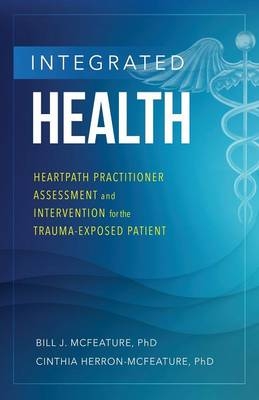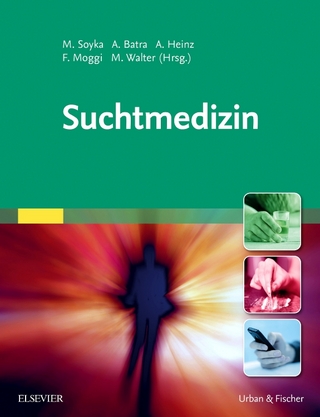
Integrated Health - HeartPath Practitioner Assessment and Intervention for the Trauma Exposed Patient
Motivational Press, Incorporated (Verlag)
978-1-62865-349-6 (ISBN)
- Keine Verlagsinformationen verfügbar
- Artikel merken
Bill J. McFeature, Ph.D. received his Doctorate of Philosophy in Clinical Psychology with 16 years of specialized training in integrative behavioral health care field in working with primary care and behavioral health practitioner in treating patients with acute and chronic medical conditions. Dr. McFeature is an SAMHSA and HRSA consultant for both primary care and community behavioral health clinics in the development and implementation of primary care and behavioral health integration model designs that align with AIM objectives. He is also the consultant for the Radford University Integrated Behavioral Health and Wellness Certificate program receiving national recognition for their participation in workforce development initiatives promoting competent integrated behavioral practitioners. Dr. McFeature is also co-author of "HeartPath Practitioner" published in 2009. Dr. McFeature is currently the owner of Kardia Counseling Center and Consultation.
Content Dedicationix Content List of Figures Forward Preface Introduction Narrative Treatment and Trauma Utilizing HeartPath Practitioner Techniques Who Benefits from Reading this Book Chapter One: The Impact of Trauma Exposure Universal Experience Trauma Theory Trauma-informed Care Research and Statistics Impact of Trauma - Physical Body -Diabetes -Cardiovascular Disease -Chronic Obstructive Pulmonary Disease (COPD) -Adult Functional Gastrointestinal Disorders (FGID)/Irritable Bowel Syndrome (IBS) -Obesity, High Body Mass Index (BMI) -Chronic Pain Syndromes (CPS) Impact of Trauma - Physical Impact of Trauma - Mental/Brain/Mind Health Impact of Trauma - Emotional Health Impact of Trauma - Spiritual Health Impact of Trauma - Social Health Impact of Trauma on the Family: Including Children/Youth Removed from Parents Chapter Two: Trauma Exposure and Life Journey Responses Types of Trauma Traumatic Life Events: Challenges to Overcome -History of Physical Abuse and Neglect -Exposure to Sexual Abuse -Victims of Human Trafficking -Domestic Violence/Intimate Partner Violence (IPV) -Homelessness -Exposure to Substance-Abusing Parents -Children/Youth in Foster Care System: Traumatic Grief -Children/Youth in Kinship Care -Vicarious Trauma/Secondary Trauma Exposure/Trauma Exposure Response -Behavioral Health and Primary Care Exposure to Vicarious/Secondary Traumatic Stress -Steps to Awareness and Managing Vicarious/Secondary Traumatic Stress -Adopted Children with History of Trauma Exposure -Children/Youth in Congregate Care with History of Trauma Exposure: Retraumatization -Historical Trauma Chapter Three: Trauma-informed Care Systems a Paradigm Shift Where do trauma-exposed individuals go for help? -Primary Care Providers -Dental Providers -Emergency Medical Technicians (First Line Responders) -Hospital Emergency Rooms -Mental Health Providers Public and Private -Pharmacists/Pharmacy Technicians -Social Workers - Public and Private -School Systems: Teachers, Guidance Counselors, School Nurses, and Administrative Staff -Foster Parents (County and Therapeutic) -Juvenile Justice Systems: Judges, Attorneys, Probation Officers, and Detention Workers -World Religions and Philosophies Integration Along a True Continuum of Care -Policies for Trauma-informed Care Across the Spectrum of Care Chapter Four: Mental Health Diagnoses and Presenting Behaviors Common to Trauma Exposure Trauma and Attachment to Self and Others Trauma and Loss of the Ability to Love Others (Sabotaging Relationships) Trauma and the Trust Factor Role (Guarded Feelings) Trauma and Mental Illness -Trauma and Posttraumatic Stress Disorder (PTSD) -PTSD with Co-occuring Substance Use Disorder -Trauma and Reactive Attachment Disorder (RAD) -Trauma and Borderline Personality Disorder (BPD) -Trauma and Oppositional Defiant Disorder (ODD) -Trauma and Conduct Disorder (CD) -Trauma and Intermittent Explosive Disorder (IED) Developing a Patient-Centered Plan of Care by Assessing the Trauma Impact of Common Core Issues Chapter Five: Understanding the Primary Care Playground - Addressing the Trauma-Exposed Patient Patient Centered Medical Home with Aligned Behavioral Health Indicators Primary Care Philosophy - Team Care Approach Competencies, Role, and Function of Behavioral Health Consultant Working in Primary Care Role of the Behavioral Health Consultant Working in the Primary Care Setting -Definition of Behavioral Health Consultant (BHC) Cultural Awareness and Sensitivity Building a "Culture of Health" Integrative Care Practice -BHC Working in Primary Care to Address the Trauma-Exposed Patient -Comprehensive Care Management Enhances Behavioral Health Consultation Model in Primary Care -A Case Study Example: 15/30 min - Behavioral Health Consult Visit Higher Rates of Cost-Related Access and Care Safety Problems An Integrated Behavioral Health Consultation Model Design for Comprehensive Health Care Services Embedding Screening, Brief Intervention, and Referral to Treatment (SBIRT) Strategy within Primary Care -What is SBIRT? Structural Integration -Critical Pathways -BHC Consultation/Brief Treatment -BHC Advanced Skills -Basic Psychopharmacology -Protocol for Psychotropic Medication Use Operation Mechanistic Structures -Referral Script for Medical Providers when speaking about a Behavioral Health Consultant -Script for the BHC during Initial Visit in the Exam Room -Feedback to Medical Providers (PCP) -Advanced Education and Certifications available for BHC's Chapter Six: Assessment and Screening Tools to Address the Complexity of the Trauma-Exposed Patient Flow of Primary Care Brief Assessments Integrated (PCP-BH Coordinated Care) Alcohol and Substance Abuse Screens Comprehensive Healthcare Primary Care Screening Measures Trauma Assessment Tools - Brief Screening Instruments HeartPath Technique Conducting "Holistic" Assessment with Scaling Questions Rationale Behind the HeartPath Technique Conduct Further Evaluation with a Personality Assessment Chapter Seven: Understanding Acute and Preventative Chronic Disease Management Diabetes -Develop Plan of Care for Diabetes (Example) Cardiovascular -Develop Plan of Care for Cardiovascular Disease (Example) Chronic Obstructive Pulmonary Disease (COPD) -Develop a Plan of Care for COPD/Asthma (Example) Adult Functional Gastrointestinal Disorders (FGID)/Irritable Bowel Syndrome (IBS) -Develop a Plan of Care for Gastrointestinal Disorders/IBS Obesity, High Body Mass Index (BMI) -Develop a Plan of Care for Obesity (Example) Chronic Pain Syndromes (CPS) - Fibromyalgia, Chronic Fatigue Syndrome, Arthritis, Crohn's Disease, Ulcerative Colitis, and Interstitial Cystitis -Develop a Plan of Care for Chronic Pain Syndromes (Example) New Research on Trauma and Cancer - Psycho-Oncology The "Telling of the Story" the Next Step for Ongoing Assessment Chapter Eight: Narrative Assessment: "The Telling of the Story" Autobiographical Narrative Narrative Drawing Thematic Analysis & Life Domains Phenomenological Reduction Grounded: Reflect upon the Pedagogic Experience Emerging Heart Memory Depicted Themes - Core and Unique: Trauma-exposed Patient The Unspoken Language of Dreams and Nightmares Dissociation A Secret Hiding Place in the Subconscious Mind Narrative Assessment and Thematic Analysis Further "Down the Rabbit Hole" Understanding Archetypes (Overview of Abiding Patterns in the Human Psyche) Through the Rabbit Hole to the Other Side Chapter Nine: HeartPath Practitioner Assessment and Techniques: To Create a Path to Qualitative Change Narrative Approaches The Telling of the Story - Rewriting "Life-World" Themes Resilience Factor Explored Future Relationships Expectations for Patient and Caregiver's Affirmation of True Self - New Life Chapter Reconciliation Chapter Ten: Mindful Awareness and HeartPath Practice - Connection with Divine Source The Science of Mindfulness The Here and Now Growing in Mindfulness Guided Imagery with HeartPath - Beyond Self-Biofeedback Surrender and Release Fear - Replace with Love of Self and Others Self-Analysis and Reflection New Perception Heartfulness Synchronicity Gratitude Hope Spirituality Spiritual Exploration Epilogue Primary Care and Behavioral Health Integration the Actualization of Trauma-Informed Care Help the Patient Find Balance with Integrated Health and Guiding Principles for Health Patient-Centered Healthcare: Recognizing Trauma HeartPath Practitioner Theoretical Framework: Assisting the Trauma-Exposed Patient Appendix ITrauma-Informed Care Resources Appendix IIIntegrated Health Resources Appendix IIIGlossary References
| Erscheinungsdatum | 30.12.2016 |
|---|---|
| Zusatzinfo | Illustrations, unspecified |
| Sprache | englisch |
| Maße | 9 x 215 mm |
| Themenwelt | Geisteswissenschaften ► Psychologie ► Persönlichkeitsstörungen |
| Medizin / Pharmazie ► Gesundheitswesen | |
| Medizin / Pharmazie ► Naturheilkunde | |
| ISBN-10 | 1-62865-349-3 / 1628653493 |
| ISBN-13 | 978-1-62865-349-6 / 9781628653496 |
| Zustand | Neuware |
| Haben Sie eine Frage zum Produkt? |
aus dem Bereich


